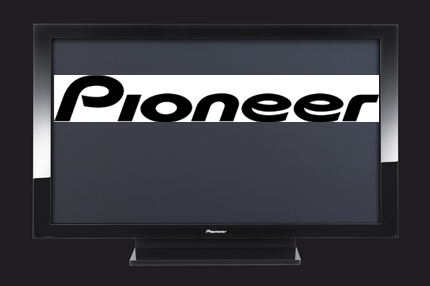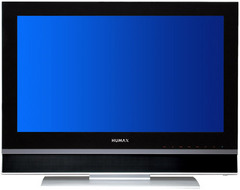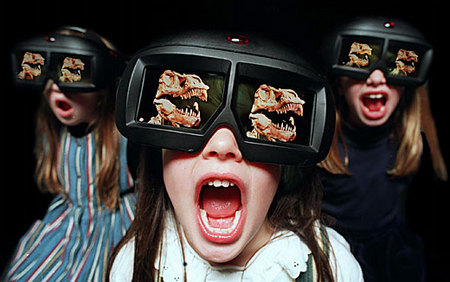Tag: HDTV
Pioneer unveils KURO plasma TVs promising deeper black levels than ever before

Pioneer has taken the wrappers off its new KURO plasma TV range, with a promise that the tellies will display 80% deeper black levels than their rivals (and so provide richer colours and sharper details).
The first two KURO TVs are 50 and 60 inches respectively, and will both be HD-ready 1080p models. What’s that? You want a suitably artsy quote? How about this: “In the art world, a plain white canvas represents a blank slate waiting for an artist to create,” says Pioneer’s Heidi Johnson-Cash. “In the world of television, a black screen is a similarly blank canvas ready for content to be displayed.”
Murdoch, Iger, Parsons: execs argue over high definition, disregarding the consumer
The rhetoric surrounding Blu-ray and HD DVD has continued, with various media executives weighing in with their opinions of each other, and even the consumer. Firstly, Rupert Murdoch commented on Paramount's decision to exclusively support HD DVD, first declaring that…
IFA 2007: The Phillips Aurea
Susi from Shiny Shiny takes a closer look at Phillips Aurea, a new ambient lighting enabled TV that Phillips is convinced will revolutionise television. You can take a look at more coverage from the Phillips press conference here.
IFA 07: Kat talks to Sharp about their 108" LCD TV, the world's largest
Still at the impressive Sharp stand, I snagged a few minutes to talk to Reinhart Buchner, PR Manager for Sharp Europe, about their 108″ LCD TV. Unveiled at CES in January this year (you might remember this video I did for it back then, dressed as Hunter S. Thompson, Las Vegas style), it’ll be available from next year, when it will still hopefully…
IFA 07: Video of Sharp's prototype 20mm thick LCD HDTVs
Remember those speccy new LCD TVs Sharp showed off in yesterday’s press conference at IFA? Yes, those stick-thin prototypes, just 20mm…
Mitsubishi developing 3D Blu-ray player
Mitsubishi is developing a Blu-ray player which can output 3D versions of your existing two-dimensional movies “on the fly”, outputting to any 120Hz-capable high definition TV.
They claim that they’ve come up with a technique which can convert each frame of a regular movie on Blu-ray disc into two separate frames, each slightly different, in order to generate the 3D effect. These two frames are sent alternately to the 120Hz set, effectively as two 60Hz feeds. How it handles 24fps films is anyone’s guess.
Ofcom survey: overall TV watching down, digital and HD up
 The latest Communications Market Report from Ofcom shows that, overall, Britons are watching slightly less TV than last year, down 4% to 3 hours and 36 minutes per day, but that viewers are watching more digital terrestrial, satellite, and high definition content.
The latest Communications Market Report from Ofcom shows that, overall, Britons are watching slightly less TV than last year, down 4% to 3 hours and 36 minutes per day, but that viewers are watching more digital terrestrial, satellite, and high definition content.
Digital TV of some kind is now in four out of five UK households, while for those 450,000 homes who have access to some kind of high definition content, 33% of their viewing time is spent watching it.
Echoing similar studies in the US, it seems that a significant proportion (43%) of those who do have high definition TV are viewing more as a result , particularly premium content such as films and sport.
Sony's next BRAVIA ad campaign: The play Doh bunnies. Cute!

Following the San Francisco bouncy balls, and the paint explosions in Glasgow, comes Sony’s third “Colour Like No Other” BRAVIA high definition TV advert.
This time, it’s Play Doh bunnies.
TV Ad Land reports “Play Doh is being staged in New York by Frank Budgen of Gorgeous Enterprises, working with a creative team from Fallon, including creative director Juan Cabral.”
Humax launches two LCD TVs with Freeview Playback
 Humax has announced the launch of their 32-inch (LP32-TDR1) and 40-inch (LP40-TDR1) LCD TVs, both of which feature built-in dual tuner digital recorders, and have achieved Freeview Playback status.
Humax has announced the launch of their 32-inch (LP32-TDR1) and 40-inch (LP40-TDR1) LCD TVs, both of which feature built-in dual tuner digital recorders, and have achieved Freeview Playback status.
We covered the basics of Freeview Playback when we reported on Humax’s PVR-9200 series of DTRs attaining the certification.
Ultra-Wideband technology given UK go-ahead by Ofcom
 Ultra Wideband (UWB) technology, which allows devices to communicate wirelessly at high speed over relatively short distances, has been given the go-ahead by Ofcom to be used unlicensed in the UK.
Ultra Wideband (UWB) technology, which allows devices to communicate wirelessly at high speed over relatively short distances, has been given the go-ahead by Ofcom to be used unlicensed in the UK.
Normally, equipment which uses a part of the radio spectrum requires a license from Ofcom in order that any interference between different users can be managed. However, UWB technology has a low power output and shouldn’t interfere with other signals.


















